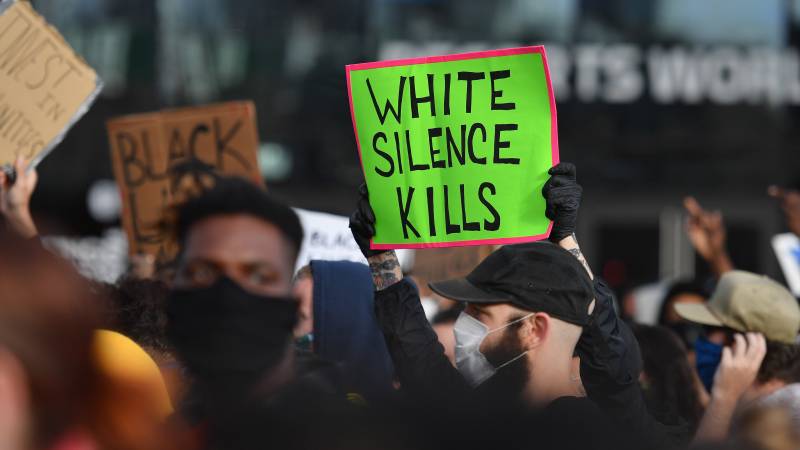Unrest grips America: key questions answered

Stay tuned with 24 News HD Android App

Six nights of furious demonstrations against police brutality and racism have rocked the United States. Here, AFP answers the key questions surrounding America's worst civil unrest in years.
What sparked the protests?
The trigger was the killing of an unarmed black man, George Floyd, at the hands of police in Minneapolis last Monday.
Floyd died after officer Derek Chauvin knelt on his neck for nearly minutes after arresting him for allegedly trying to buy cigarettes with a counterfeit note.
His death, captured on mobile phone footage, reignited long-felt anger over police killings of African Americans, and echoed high-profile cases like Michael Brown in Ferguson and Eric Garner in New York that spurred the Black Lives Matter movement.
Peaceful demonstrations quickly turned violent in the Midwestern city, which saw looting and arson, before erupting from coast-to-cost in United States. Many commentators say Floyd's death was a match that lit the fuse on resentment stemming from years of health, social and economic inequalities.
Some also see the COVID-19 pandemic -- which has cost 100,000 lives and 40 million jobs, disproportionately affecting minority communities and leaving countless youths stuck at home under lockdown -- as having created the perfect storm.
How have the authorities responded?
At least 40 cities, including Los Angeles, Chicago and the capital Washington, have imposed night-time curfews but they have done little to deter protesters or suppress rioting.
Governors have also mobilized thousands of National Guard soldiers, a rare move that evoked disturbing memories of rioting in US cities in the late 1960s following the death of civil rights leader Martin Luther King Jr. Police have filed rubber bullets, tear gas, stun grenades and pepper spray at demonstrators who have launched projectiles, including water bottles and rocks, at officers.
The measures have been unable to stop widespread looting and vandalism, including of luxury stores in New York, the blocking of roads, and the burning of police vehicles. Politicians of all stripes have said the violence must stop.
But many local leaders have also expressed sympathy at decades of injustice against the black minority and some police officers, including in New York and New Jersey, have knelt in sympathy with demonstrators.
What has Donald Trump been saying?
Trump has yet to address the nation since the unrest flared up, but he has been tweeting -- a lot. In summary the US president has blamed the rioting on left-wing extremists, saying he planned to designate a loose-knit anti-fascist network known as Antifa as a terrorist organization.
Trump has branded demonstrators "thugs" and demanded that state governors restore law and order -- and has sought to politicize the crisis by attacking Democratic officials for their handling of protests. While the president has acknowledged Floyd's death to be a "grave tragedy," he also sparked outrage and accusations that he was stoking further violence when he tweeted: "When the looting starts, the shooting starts."
In contrast, Trump's Democratic rival Joe Biden has said the nation was "in pain" and that as president he would "listen" and "lead a conversation" about the protesters' grievances.
What happens next?
The question on everyone's mind is how long the unrest will last -- and how much further it might spread.
"Riots like this, protests like this... usually burn out after three or four days," says Candace McCoy, a criminal justice professor and expert on the history of protests at the City University of New York.
Will that prove true this time around, in a supercharged political climate five months from the election?
"What is different now is the political situation is very volatile," said McCoy.
Floyd's younger brother, Terrence Floyd, has condemned the violence and called on protesters to "just channel your anger elsewhere."
In an interview with ABC News he said: "Sometimes I get angry. I want to go crazy. My brother wasn't about that. You'll hear a lot of people saying, 'He was a gentle giant.'"
Chauvin, the Minneapolis police officer, has been charged with third-degree murder, but protesters want the charge toughened, arguing he killed Floyd with intent. They also want charges against the three officers who assisted Chauvin.
Even that may not be enough -- with widely-shared footage of heavy-handed policing against protesters fanning the flames and all-but-drowning out appeals for calm by the likes of Floyd's brother. But looking ahead, McCoy also sees a hopeful sign in the large numbers of white protesters joining forces to demand racial justice for the black community.
A stance echoed by former president Barack Obama, who penned an op-ed suggesting this could -- perhaps -- prove "a real turning point" in the quest for criminal justice and police reform.
